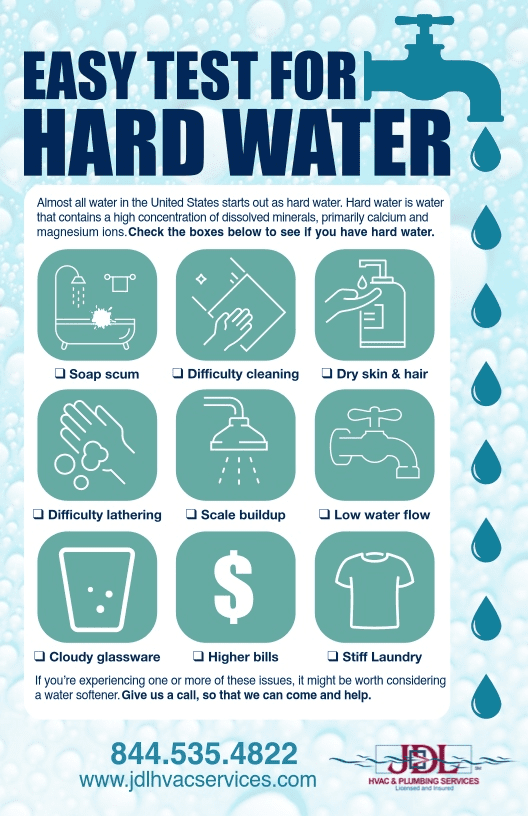Do I Have Hard Water? Understanding the Signs and Solutions

What is Hard Water?
Hard water is water that contains a high concentration of dissolved minerals, primarily calcium and magnesium. While not harmful to health, hard water can cause various household and personal issues. Nearly all water in the United States begins as hard water before being treated. If you are facing these issues, finding a hard water solution can greatly improve your water quality.
Signs You Have Hard Water
If you’re experiencing one or more of these issues, you may have hard water:
- Soap Scum Buildup – Hard water prevents soap from dissolving properly, leading to a filmy residue on sinks, tubs, and shower doors.
- Spotty Dishes and Glassware – If you notice white spots or a cloudy film on dishes after washing, hard water may be to blame.
- Dry Skin and Hair – Minerals in hard water can strip natural oils from your skin and hair, causing dryness and irritation.
- Reduced Lather from Soaps and Detergents – Hard water makes it harder for soaps and shampoos to create a rich lather.
- Limescale Buildup in Appliances – Water heaters, coffee makers, and dishwashers may develop a chalky white residue, reducing efficiency and lifespan.
- Clogged Plumbing and Fixtures – Mineral deposits from hard water can accumulate in pipes and faucets, leading to blockages and reduced water pressure.
- Faded and Stiff Laundry – Clothes washed in hard water often feel rough and may fade more quickly over time.
How Hard Water Affects Your Home
Hard water can impact multiple aspects of your home, leading to both short-term inconveniences and long-term damage:
1. Appliances and Plumbing Systems
- Hard water can shorten the lifespan of water heaters, washing machines, and dishwashers by 30% or more.
- Scale buildup in plumbing reduces efficiency and increases energy costs.
- Frequent repairs or replacements may be needed for household appliances.
2. Energy Efficiency and Costs
- Water heaters with mineral buildup require more energy to heat water.
- Hard water reduces overall efficiency, leading to higher utility bills.
3. Personal Care Effects
- Hair may feel sticky, brittle, or heavy after washing.
- Skin may become itchy, flaky, or more prone to acne due to clogged pores from mineral residue.
How to Test for Hard Water
If you’re unsure whether you have hard water, try these simple tests:
1. The Soap Test
- Fill a bottle with water and add a few drops of dish soap.
- Shake the bottle and observe the lather.
- If the soap doesn’t produce a lot of bubbles and forms a cloudy residue, your water is likely hard.
2. The Water Stain Test
- Check sinks, tubs, and glassware for white, chalky deposits.
- If these spots are difficult to remove, hard water is likely present.
3. Professional Water Testing
- You can purchase a water hardness test kit from a hardware store.
- For a more accurate reading, contact JDL HVAC & Plumbing Services for expert water testing.
Water Softening Solutions
If you have hard water, installing a water softener can help eliminate the negative effects. Water softeners work by removing calcium and magnesium through an ion-exchange process, replacing them with sodium or potassium ions.
Benefits of Water Softeners
- Extends Appliance Lifespan – Prevents limescale buildup in appliances, increasing longevity.
- Reduces Plumbing Repairs – Keeps pipes free from mineral blockages.
- Improves Soap and Detergent Effectiveness – Helps soaps lather better, requiring less usage.
- Softer Skin and Hair – Reduces dryness and irritation.
- Brighter, Softer Laundry – Clothes feel fresher and maintain color longer.
- Lower Energy Bills – Soft water allows water heaters to work more efficiently.
Types of Water Softeners
There are several types of water softeners available:
- Salt-Based Ion Exchange Softeners
- The most common type, these systems remove hardness minerals by exchanging them for sodium or potassium.
- Requires periodic refilling of salt.
- Salt-Free Conditioners
- These systems prevent minerals from sticking to surfaces but do not remove them.
- Suitable for mild hard water issues.
- Reverse Osmosis Systems
- Uses a membrane to remove contaminants and minerals.
- Provides high-quality drinking water but may not be cost-effective for whole-home use.
- Magnetic or Electronic Descalers
- Use electromagnetic fields to alter the properties of minerals, reducing buildup.
- Less effective than traditional water softeners but require no maintenance.
Choosing the Right Water Softener
When selecting a water softener, consider the following factors:
- Water Hardness Level – Measured in grains per gallon (GPG); higher levels require stronger softening solutions.
- Household Water Usage – Choose a system that can handle daily water needs.
- Installation Space – Some systems require significant space for tanks and plumbing modifications.
- Maintenance Requirements – Salt-based systems require regular refilling, while salt-free options are lower maintenance.
Professional Water Softener Installation
For reliable and professional water softener installation, JDL HVAC & Plumbing Services can help. Our experts will assess your water quality and recommend the best solution for your home.
- Call us today at (844) 535-4822 to schedule an appointment.
- Email us at [email protected] for inquiries.
- Book your service online: JDL HVAC & Plumbing Booking
Conclusion
Hard water is a common issue that affects many households, leading to plumbing damage, inefficient appliances, and personal care concerns. Identifying hard water signs and investing in a quality water softener can save you money, improve water efficiency, and enhance overall comfort in your home. If you suspect hard water in your home, testing and treating it early can prevent long-term damage and costly repairs. Contact JDL HVAC & Plumbing Services today for expert solutions!
